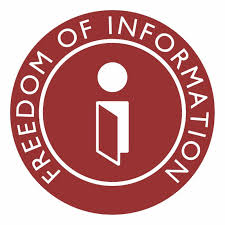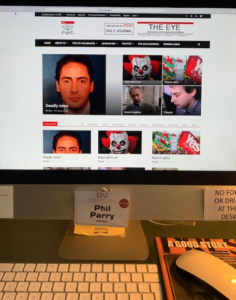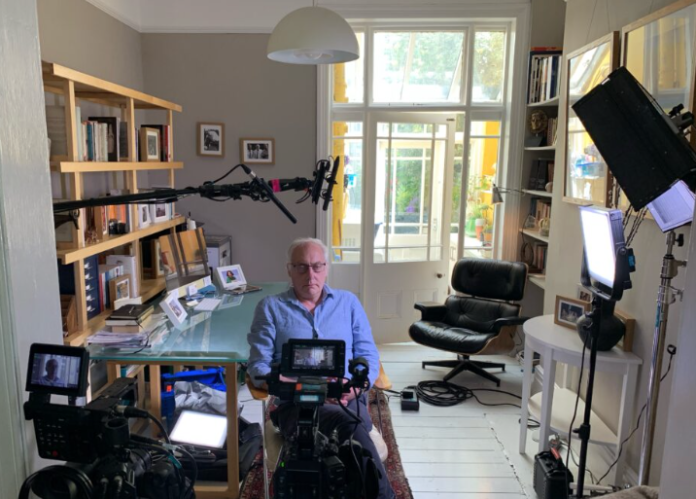- Lucy in the sky behind bars - 5th February 2026
- Sorry is the hardest word… - 4th February 2026
- Car trouble - 3rd February 2026
 After revealing a string of important facts on The Eye, such as how a Welsh university employed an ‘academic’ jailed for a massive fraud in America, or the truth about a country hosting the World Cup Wales qualified for, the huge importance of this kind of work by our Editor, Welshman Phil Parry, has now been underlined by a legal victory for another investigative journalist, who was described in a ruling this week as “establishing a public interest defence”.
After revealing a string of important facts on The Eye, such as how a Welsh university employed an ‘academic’ jailed for a massive fraud in America, or the truth about a country hosting the World Cup Wales qualified for, the huge importance of this kind of work by our Editor, Welshman Phil Parry, has now been underlined by a legal victory for another investigative journalist, who was described in a ruling this week as “establishing a public interest defence”.
Earlier he described how he was assisted in breaking into the South Wales Echo office car when he was a cub reporter, recalled his early career as a journalist, the importance of experience in the job, and making clear that the‘calls’ to emergency services as well as court cases are central to any media operation.
 He has also explored how poorly paid most journalism is when trainee reporters had to live in squalid flats, the vital role of expenses, and about one of his most important stories on the now-scrapped 53 year-old BBC Wales TV Current Affairs series, Week In Week Out (WIWO), which won an award even after it was axed, long after his career really took off.
He has also explored how poorly paid most journalism is when trainee reporters had to live in squalid flats, the vital role of expenses, and about one of his most important stories on the now-scrapped 53 year-old BBC Wales TV Current Affairs series, Week In Week Out (WIWO), which won an award even after it was axed, long after his career really took off.
Phil has explained too how crucial it is actually to speak to people, the virtue of speed as well as accuracy, why knowledge of ‘history’ is vital, how certain material was removed from TV Current Affairs programmes when secret cameras had to be used, and some of those he has interviewed.
He has disclosed as well why investigative journalism is needed now more than ever although others have different opinions, how the pandemic played havoc with media schedules, and the importance of the hugely lower average age of some political leaders compared with when he started reporting.

If anyone needs any confirmation of the vital role played by investigative journalism in uncovering facts others would prefer to keep hidden, it came in a legal judgement this week.
The investigative journalist Carole Cadwalladr won her High Court libel case, against the multi-millionaire Brexiteer, Arron Banks, and in the judgement it was concluded that she had “succeeded in establishing a public interest defence“.

In a lecture and tweet linking to it, Ms Cadwalldr had suggested that Mr Banks (the founder of the pro-Brexit campaign group Leave.EU) lied about his links with Russia, and he sued her for defamation
Yet after a five day hearing earlier, the court judgement on Monday was a strong resolution in her favour.


I celebrate what has happened, but it only serves to emphasise how this kind of journalism is becoming increasingly difficult to pursue (involving factors such as building up an array of trusted sources, as well as a detailed knowledge of the law), and that the tools at our disposal are growing rarer.
Take for example The Freedom of Information Act 2000.
People seem to view it as the answer to everything, but it isn’t, because it is riddled with opt-outs for wrong-doers to hide behind.
It was put on the statute book to fulfil a campaign promise from the UK Labour Government, and it is a pale imitation of the version in the USA. There are actually TWENTY THREE official exemptions, which organisations can use to avoid giving crucial details.

On many occasions I have been called “vexatious”, when giving important truths has been formally denied, but recently I came across exclusions that were new to me.
The ironically-named ‘Disclosure Unit’ of controversial South Wales Police (SWP) have refused to give details of a huge alleged bribery investigation in which contentious Swansea University (SU) was at the heart.

It followed creation of the £200 million (much of it public money) ‘Llanelli Wellness and Life Science Village’ (Delta Lakes) project, rebranded as ‘Pentre Awel – Breezy/Windy Village’, and it formed part of the £1.3 billion Swansea Bay City Region Deal (SBCRD), which was run in partnership with SU as well as Hywel Dda and Abertawe Bro Morgannwg health boards. 86 acres of land at Delta Lakes had planning permission, and the giant venture was to have included research, with business development facilities, a state-of-the-art care home as well as an assisted living and rehabilitation centre, outdoor leisure space, a wellness hotel, and a new leisure centre.

But a statement about it from SU declared: “The police have confirmed to Swansea University that there was evidence of potential criminal offending identified and secured against individuals and companies subject to their enquiry…The university’s decision to dismiss (a key official) was based on serious breaches of Swansea University procedures and was never dependent on a criminal investigation by the police or decision to prosecute by the CPS (Crown Prosecution Service)“.

During the police inquiry, properties in Swansea, Carmarthenshire and Kent were searched. SWP said the Regional Organised Crime Unit (Tarian) executed “a number of warrants as part of an investigation into alleged bribery offences. Seven (then eight) addresses in Swansea, Carmarthenshire, and Kent are being searched with the assistance ofcolleagues”. The searches involved officers from SWP, Dyfed Powys Police and Kent Police forces, yet The Eye were alone in disclosing the properties raided by the police.

 The SWP’s, so-called ‘Disclosure Unit’, though, seemed LESS willing to give this kind of information, through an FOIA.
The SWP’s, so-called ‘Disclosure Unit’, though, seemed LESS willing to give this kind of information, through an FOIA.
It said: “Your request has been considered and we are not obliged to supply…information. The following exemptions apply: Section 30(1) – Investigations and Proceedings Conducted by Public Authorities Section 40(2) – Personal Information”.

There was no luck either in getting information on this scandal from the Crown Prosecution Service (CPS), to which the police report about it was sent.
A ‘Ms J Fasulo‘ in the CPS mis-named ‘Information Access Team’ said: “On balance I consider the public interest favours maintaining the exemption”.

However these organisations are not alone.
ANOTHER university (this time in England) has a special section of its policy given online, which is headlined ‘EXEMPTIONS’.
It proclaims: “There are 23 exemptions under the Freedom of Information Act 2000, that may mean we are not able to disclose the information. There are two types of Exemption: Absolute, and Non-Absolute. Non-Absolute Exemptions require a Public Interest Test. This is where we must decide whether it is in the public interest to disclose the sensitive information or to withhold it.”

The document (which WASN’T secured using an FOIA!) continues: “You can refuse an entire request under the following circumstances:
- It would cost too much or take too much staff time to deal with the request.
- The request is vexatious.
- The request repeats a previous request from the same person.

“Some exemptions relate to a particular type of information, for instance, information relating to government policy. Other exemptions are based on the harm that would arise or would be likely arise from disclosure, for example, if disclosure would be likely to prejudice a criminal investigation or prejudice someone’s commercial interests. There is also an exemption for personal data if releasing it would be contrary to the UK General Data Protection Regulation (the UK GDPR) or the Data Protection Act 2018 (the DPA2018).
“You can automatically withhold information because an exemption applies only if the exemption is ‘absolute’. This may be, for example, information you receive from the security services, which is covered by an absolute exemption. However, most exemptions are not absolute but require you to apply a public interest test. This means you must consider the public interest arguments before deciding whether to disclose the information. So you may have to disclose information in spite of an exemption, where it is in the public interest to do so.”

At least there has now been a legal ruling in favour of one investigative journalist, that she had “succeeded in establishing a public interest defence“.
But the law seems to give with one hand and take away with the other!
Phil’s memories of his extraordinary 38-year award-winning career in journalism and 23 years at the BBC (when legal knowledge was always pivotal) as he was gripped by the incurable disabling condition Hereditary Spastic Paraplegia (HSP), have been released in the major book ‘A GOOD STORY’. Order it now!

Regrettably publication of another book, however, was refused, because it was to have included names.








